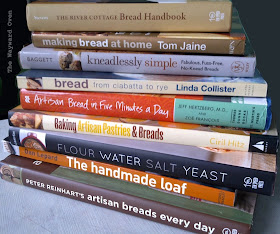| WONDER BREAD |
If I'm going to make new year resolutions, I'd rather they be something I already do and enjoy doing... and just aspire to do them better and/or more often.
Well, it's no secret that I like baking and most of all, I like making bread.
I haven't actually resolved to bake bread more often, but if I had, I have so far stuck to it. In the first two weeks of 2013 alone, I have made more varieties of bread than I have in any one month last year.
This enthusiasm actually started a few days before Christmas when my leave started, but continued even when I had to go back to work a few days ago. I've made sweet, savoury and everyday breads with both wild yeast and commercial and I'm happy that, except for one loaf, every attempt has turned out well, and a couple that surprised me because they were so good.
References
There is still much to learn in breadmaking, but the little success I have today I owe to some excellent reference material.
 |
| Read, read, read |
First and foremost, my bread books. All have benefitted me tremendously since I bought them, but the four at the bottom were especially helpful when my baking blitz started. I still have Jeffrey Hamelmann's latest book to add to this stack.
And when it's difficult to visualise a technique from the written word, I turn to YouTube. I've learned a lot from watching demonstrations by both professional and home bakers alike. Trying our different methods has also helped me develop my own way of doing things, for example, kneading and shaping.
Raising agents
I bake bread with wild as well as instant yeast, and they both have their merits. Sometimes, I make hybrid doughs, with a touch of instant yeast. I don't apologise for it because in the end, this is bread that I want to eat and it's still so much better than the commercial varieties.
 |
| Leaveners: wild yeast mother starter and instant yeast |
Tools
I do like gadgets, and sometimes I give in to temptation but most times, I resist the urge since I don't have much room in my apartment to store everything.
I did buy a good electric stand mixer a couple of years ago though, but I find myself using my hands to mix and knead bread dough.
 |
| Helpful and essential utensils |
There are only a few trusty tools for the task: A dough whisk starts off the mixing and then dough scrapers help during the kneading process.
A digital scale, knives for scoring and baking parchment are essential and thermometers have been invaluable. The instant read thermometer tells me whether a loaf is cooked through and I don't have to rely on my own judgement of whether a loaf sounds hollow or not. But the one for the oven has saved my baked goods. As my oven got older, it was taking longer to warm up. My cakes used to come out with the centre still soupy, so I would bake them longer and then the crust would dry out. I only found out after I got the thermometer that the oven is off by about 40ºC!
 |
| An upturned oven tray simulates hearth baking |
Speaking of that wayward oven, I've tried to simulate hearth baking in it not with a baking stone but with an upturned tray. The oven came with a heavy metal tray and I slide bread (that has proofed on parchment paper) directly onto the preheated tray. My "peel" is an old cake board. I put another tray on the wire rack below and fill it with water to create steam.
 |
| Dutch oven |
Like many people, I learnt about baking bread in a Dutch oven from Jim Lahey's no-knead method. I have to admit, however, that while I was fascinated with how it worked in the beginning (and there have been times when the bread came out like a dog's chew toy!), the fascination wore off since, besides having bread to eat, I enjoy the whole hands-on breadmaking process.
And then I got Ken Forkish's Flour Water Salt Yeast (my latest book), which uses the Dutch oven in all the recipes. He also uses his hands to do all the mixing right from the start! So I have fallen back in love with using the pot for breadmaking. The picture at the top of the post, by the way, is Ken Forkish's White Bread with 80% Biga. Why would I not want to make more bread in the Dutch oven when it comes out looking like that! More on it in a future post.
And now on with the show!

Your dutch oven looks well used...I have seen many brands appearing of recent and contemplating getting one too!
ReplyDelete